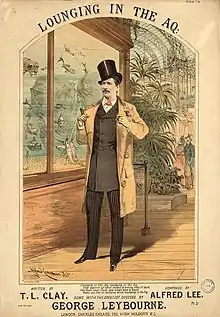Lion comique
The lion comique was a type of popular entertainer in the Victorian music halls, a parody of upper-class toffs or "swells" made popular by Alfred Vance and G. H. MacDermott, among others. They were artistes whose stage appearance, resplendent in evening dress (generally white tie), contrasted with the cloth-cap image of most of their music-hall contemporaries.

The songs the lions comiques sang were "hymns of praise to the virtues of idleness, womanising and drinking",[1] perhaps the most well known of which is George Leybourne's "Champagne Charlie". The lion comique deliberately distorted social reality for amusement and escapism.[2]
References
Citations
- Kift & Kift (1996), p. 49
- Vicinus (1975), p. 262
Bibliography
- Kift, Dagmar; Kift, Roy (1996), The Victorian Music Hall: Culture, Class and Conflict, Cambridge University Press, ISBN 978-0-521-47472-6
- Vicinus, Martha (1975), Industrial Muse: Study of Nineteenth Century British Working-class Literature, Croom Helm social history series (1 ed.), Croom Helm, ISBN 978-0-85664-131-2
This article is issued from Wikipedia. The text is licensed under Creative Commons - Attribution - Sharealike. Additional terms may apply for the media files.
